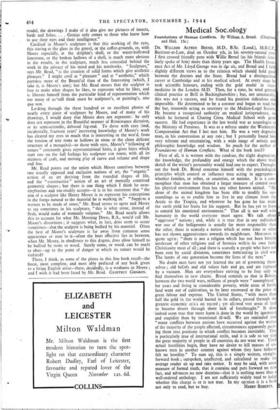Medical Sociology
Foundations of Human Conflicts. By William A. Bread. (Chap and Hall. 15s.) Da. WILLIAM ALFRED BREND, M.D., B.Sc. (Lond.), M.R.C.P. Barrister-at-Law, died on October 5th, in his seventy-second year I first crossed friendly pens with Willie Brend (as his friends fami liarly spoke of him) more than thirty years ago. The Health Insur ance Act of Mr. Lloyd George was in rile air, and Brend and I hel slightly different views as to the relation which should hold g between the doctors and the State. Brend had a distinguished career at Cambridge and at his medical school. At every stage he took scientific honours, ending with the gold medal in state- medicine in the London MD. Then, for a time, he tried general clinical practice at Brill in Buckinghamshire ; but, not unnaturally, this was not a success, and be found his position ridiculous and impossible.- He determined to be a coroner and began .to read for the bar, meanwile acting as secretary to the Medico-Legal Society. He became a recognised authority on medical jurisprudence, on which he lectured at Charing Cross Medical School with great success. He had experience in the last world war as neurologist to the Ministry of Pensions. It was as a referee under the Workmen Compensation Act that I last met him. He was a very dogmatic man, in his conversation at any rate ; but I personally found him very tolerant and entertaining, with a wide range of artistic and philosophic knowledge and wisdom. So much for the author ut Foundations of Human Conflicts. What of the book itse:f?
First of all, it is written with the candour, the slight dogmatism, the knowledge, the profundity and energy which the above brief sketch of the writer's personality would lead one to expect. Through- out the book Dr. Brend concerns- himself with the psychological principles which control or influence men acting in aggregates— whether families, or tribes, or countries, or nations. It is a com- monplace that man has obtained a larger measure of control over his physical environment than has any other known animal. " He alone of the animal kingdom has been able to modify his sur- roundings so as to enable him to live in any climate from the Arctic to. the Tropics, and wherever he has gone he has made the earth yield her fruits for his support. But he has yet to learn to control his emotional environment." That all is not well with humanity in the 'world everyone 'must agree. We talk about " aggressor " nations ; and, while it is true that in any individual war one of the belligerents is usually far more responsible than the other, there is scarcely. a nation which at some time or other has not shown aggressiveness towards its neighbours. Moreover, to quote again: " there is not a religion which has not been bitterly intolerant of other religions and of heresies -within its own faith, Christianity most of all ; and there is scarcely a people who have not been rent by social divisions, sometimes terminating in civil war. The lambs of one generation become the lions of the next."
No doubt men have not yet learned the art of governing them- selves ; , old beliefs and old values fade and go, and are replaced by a vacuum. Men are everywhere striving to be free only to find themselves in' new chains. Brend reminds us that in Britain, between the two world wars, millions of people were " unemployed" for years and living in considerable poverty, while areas of fertile land went out of cultivation, to be later recovered at the price of great. labour and expense. The United States, "with more than half the gold in the world buried in its cellars, passed through the greatest economic crisis on record ; yet allowed vast areas of land to become desert through sheer lack of forethought." It does indeed seem true that more harm is done in the world by ignorance and stupidity than by intentional We are reminded that " many conflicts between nations have occurred against the wishes of the majority of the people affected, circumstances apparently push- ing them into positions in which conflict becomes inevitable. This is particularly true of international strife, and it is safe to say that the great majority of people in all countries do not want war. Until actual hostilities begin, they have no desire to kill masses of un- known men in another country against whom they have hitherto felt no hostility." To sum up, this is a simply written, straight- forward book ; outspoken, unaffected, and calculated to make the average reader sit up and take notice. It may be said, with some measure of formal_ truth, that it contains and puts forward no new fact, and advances no new doctrine—thai it is nothing more than a well-ordered anthology. I am not sufficiently widely read to judge whether this charge is or is not true. In my opinion it is a book


























 Previous page
Previous page